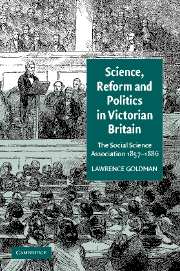Book contents
- Frontmatter
- Contents
- List of illustrations
- Acknowledgements
- Note on citations in the text
- List of abbreviations
- Introduction: the contexts of the Social Science Association
- Part I POLITICS
- Part II REFORM
- Chapter 4 Liberalism divided and feminism divided: women and the Social Science Association
- Chapter 5 Transportation, reformation, and convict discipline: the Social Science Association and Victorian penal policy 1853–1871
- Chapter 6 Victorian socio-medical liberalism: the Social Science Association and state medicine
- Chapter 7 Labour and capital: the Social Science Association, trade unionism, and industrial harmony
- Chapter 8 The Social Science Association and middle-class education: secondary schooling, endowments, and professionalisation in mid-Victorian Britain
- Chapter 9 The Social Science Association and the making of social policy
- Part III SCIENCE
- Part IV DECLINE
- Conclusion: The Social Science Association and social knowledge
- Appendix I The founders of the Social Science Association, 29 July 1857
- Appendix II Social Science Association Congresses, 1857–1884
- Appendix III Presidents of the Social Science Congresses, 1857–1884
- Appendix IV Departmental presidents, 1857–1884
- Select bibliography
- Index
Chapter 8 - The Social Science Association and middle-class education: secondary schooling, endowments, and professionalisation in mid-Victorian Britain
Published online by Cambridge University Press: 22 September 2009
- Frontmatter
- Contents
- List of illustrations
- Acknowledgements
- Note on citations in the text
- List of abbreviations
- Introduction: the contexts of the Social Science Association
- Part I POLITICS
- Part II REFORM
- Chapter 4 Liberalism divided and feminism divided: women and the Social Science Association
- Chapter 5 Transportation, reformation, and convict discipline: the Social Science Association and Victorian penal policy 1853–1871
- Chapter 6 Victorian socio-medical liberalism: the Social Science Association and state medicine
- Chapter 7 Labour and capital: the Social Science Association, trade unionism, and industrial harmony
- Chapter 8 The Social Science Association and middle-class education: secondary schooling, endowments, and professionalisation in mid-Victorian Britain
- Chapter 9 The Social Science Association and the making of social policy
- Part III SCIENCE
- Part IV DECLINE
- Conclusion: The Social Science Association and social knowledge
- Appendix I The founders of the Social Science Association, 29 July 1857
- Appendix II Social Science Association Congresses, 1857–1884
- Appendix III Presidents of the Social Science Congresses, 1857–1884
- Appendix IV Departmental presidents, 1857–1884
- Select bibliography
- Index
Summary
The Social Science Association considered all stages of education – elementary, secondary, higher, and what we would now call continuing – and all aspects of learning, from the curriculum and the training of teachers to the design of school buildings. It placed its greatest emphasis, however, on the promotion of ‘middle-class education’, so-called. This reflected its members' natural interests as well as the objectively poor state of provision for the sons and daughters of the bourgeoisie at mid-century. As the Birmingham Daily Press explained after the SSA's first congress,
The people discussing … [middle-class education] are those whom it directly affects, and it becomes the class which has been admitted to a great amount of political influence, and which is responsible for the commercial prosperity of the country, to assert their right to all the advantage and all the consideration which the highest kind of education, and the honours which have hitherto attended it, can confer.
The Association was able to bring leading figures together to debate the issues and it foreshadowed subsequent national developments in its early discussions. Its pressure forced action from the state at one crucial moment in 1864 when the Schools Inquiry Commission, the so-called Taunton Commission, which examined the subject in legendary detail, was appointed. The Association fulfilled its role as the pre-eminent forum for women's causes by helping to secure consideration of girls' education in the process of reform.
- Type
- Chapter
- Information
- Science, Reform, and Politics in Victorian BritainThe Social Science Association 1857–1886, pp. 236 - 261Publisher: Cambridge University PressPrint publication year: 2002
- 1
- Cited by



